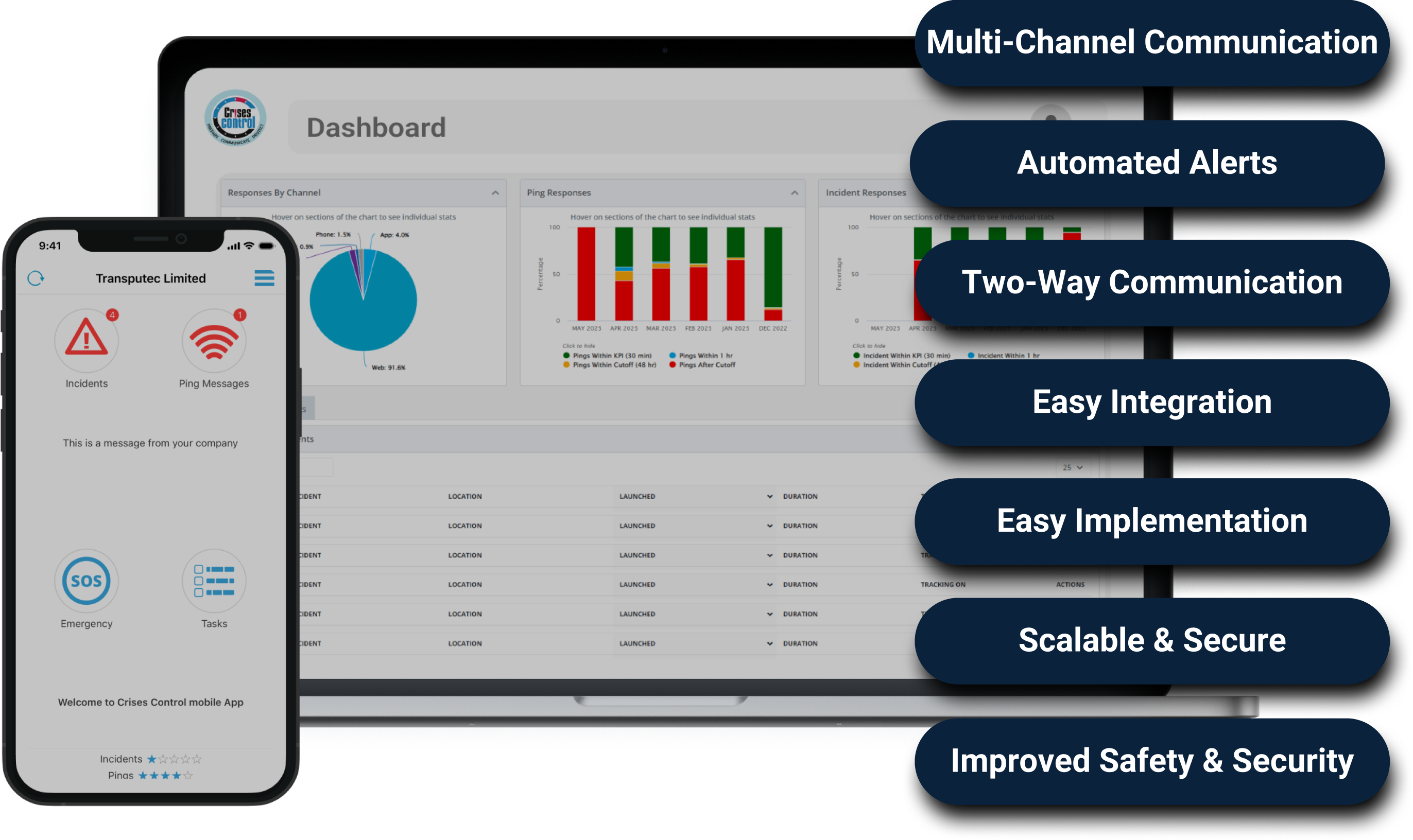Written by Anneri Fourie | Marketing Executive
In today’s rapidly evolving business landscape, the ability to withstand and recover from unexpected disruptions has become a critical differentiator. As organisations navigate an increasingly complex and unpredictable environment, a well-crafted business continuity plan (BCP) has emerged as a strategic imperative. At Crises Control, we understand the importance of empowering businesses to maintain operations, protect their assets, and ensure the safety of their employees during times of crisis.
The Importance of Business Continuity Planning
Business continuity planning is the process of identifying potential threats, assessing their impact, and developing a comprehensive strategy to ensure the continuity of critical business functions. Whether it’s a natural disaster, a cyberattack, or a global pandemic, the ability to respond effectively and minimise downtime can make the difference between survival and collapse.
By implementing a robust BCP, organisations can:
- Mitigate Risks: Proactively identify and address potential threats, reducing the likelihood and impact of disruptive events.
- Ensure Operational Resilience: Maintain critical operations and services, even in the face of adversity, safeguarding revenue streams and customer trust.
- Protect Assets and Data: Secure valuable assets, including intellectual property, financial data, and customer information, from loss or compromise.
- Enhance Compliance: Comply with industry regulations and standards, which often mandate the implementation of comprehensive business continuity measures.
- Strengthen Reputation: Demonstrate to stakeholders, customers, and the broader market that the organisation is prepared to weather any storm, enhancing its reputation and competitive edge.
Key Components of an Effective Business Continuity Plan
Crafting a comprehensive and effective business continuity plan requires a methodical approach. At Crises Control, we’ve identified the following essential elements that should be included in a robust BCP:
1. Risk Assessment and Business Impact Analysis
The foundation of a BCP is a thorough understanding of the potential threats facing the organisation and the potential impact of those threats on critical business functions. This involves conducting a comprehensive risk assessment and a detailed business impact analysis (BIA) to identify vulnerabilities, prioritise risks, and quantify the potential consequences of disruptions.
2. Recovery Strategies and Contingency Plans
Based on the risk assessment and BIA, the BCP should outline specific strategies and contingency plans to maintain or quickly resume critical operations. This may include the identification of alternative suppliers, the establishment of backup communication channels, the implementation of data backup and recovery systems, and the designation of alternate work locations.
3. Incident Response and Communication Plan
A well-defined incident response plan is crucial for coordinating the organisation’s actions during a crisis. This plan should detail the roles and responsibilities of the crisis management team, outline communication protocols for internal and external stakeholders, and provide pre-scripted messaging to ensure a consistent and effective response.
4. Employee Preparedness and Training
Employees are the backbone of any organisation, and their readiness and responsiveness during a crisis can make or break the success of the BCP. The plan should include comprehensive training programs to educate employees on their roles, responsibilities, and the appropriate actions to take in the event of a disruption.
5. Testing, Maintenance, and Continuous Improvement
A BCP is not a static document; it must be regularly tested, reviewed, and updated to ensure its ongoing effectiveness. The plan should include a schedule for conducting simulations, exercises, and audits to identify gaps and areas for improvement. This continuous refinement process helps organisations stay ahead of evolving threats and adapt to changing business conditions.
Leveraging Technology for Effective Business Continuity

In today’s digital age, technology plays a crucial role in enhancing the effectiveness of business continuity planning. At Crises Control, we offer a comprehensive enterprise-grade critical event management platform that empowers organisations to streamline their BCP implementation and response efforts.
Our platform provides a range of features that can significantly improve your business continuity capabilities, including:
- Incident Management: Centralised incident reporting, real-time status updates, and automated escalation procedures to ensure a coordinated and efficient response.
- Communication and Collaboration: Seamless communication with employees, customers, and stakeholders through multiple channels, including SMS, email, and mobile app notifications.
- Reporting and Analytics: Detailed reporting and analytics to track the effectiveness of your BCP, identify areas for improvement, and demonstrate compliance with regulatory requirements.
- Customisable Workflows: Flexible, drag-and-drop workflows that allow you to tailor the platform to your organisation’s unique business continuity needs and processes.
By integrating our critical event management platform into your business continuity planning efforts, you can enhance your organisation’s resilience, streamline your response capabilities, and ensure the continuity of your most critical operations.
Navigating the Challenges of Business Continuity Planning
Developing and implementing a comprehensive business continuity plan is not without its challenges. Organisations may face obstacles such as:
- Lack of Awareness: Some businesses may underestimate the importance of business continuity planning, leading to a lack of prioritisation and investment.
- Resource Constraints: Smaller organisations, in particular, may struggle to allocate the necessary financial and human resources to develop and maintain a robust BCP.
- Complexity of Planning: The process of identifying risks, assessing impacts, and crafting effective recovery strategies can be daunting, especially for businesses with complex operations or multiple locations.
- Resistance to Change: Organisational inertia and a reluctance to embrace new processes and technologies can hinder the successful implementation and adoption of a BCP.
To overcome these challenges, it’s crucial to foster a culture of preparedness and resilience within the organisation. This can be achieved through executive-level buy-in, comprehensive employee training, and the adoption of user-friendly, technology-driven solutions like the Crises Control platform.
Conclusion: Unlocking Business Resilience with Crises Control
In today’s volatile business environment, a well-designed and effectively implemented business continuity plan is no longer a luxury, but a necessity. By partnering with Crises Control, you can unlock the power of business resilience and ensure the long-term success of your organisation.
Our award-winning critical event management platform, combined with our expertise in business continuity planning, can help you navigate the complexities of this crucial process. From risk assessment and recovery strategy development to incident response and employee preparedness, we are committed to empowering your organisation to withstand and overcome any challenge that comes its way.
Take the first step towards building a resilient and future-proof business. Contact us today to schedule a free demo of the Crises Control platform and learn how we can help you craft an effective business continuity plan that safeguards your organisation’s future.
Request a FREE Demo









